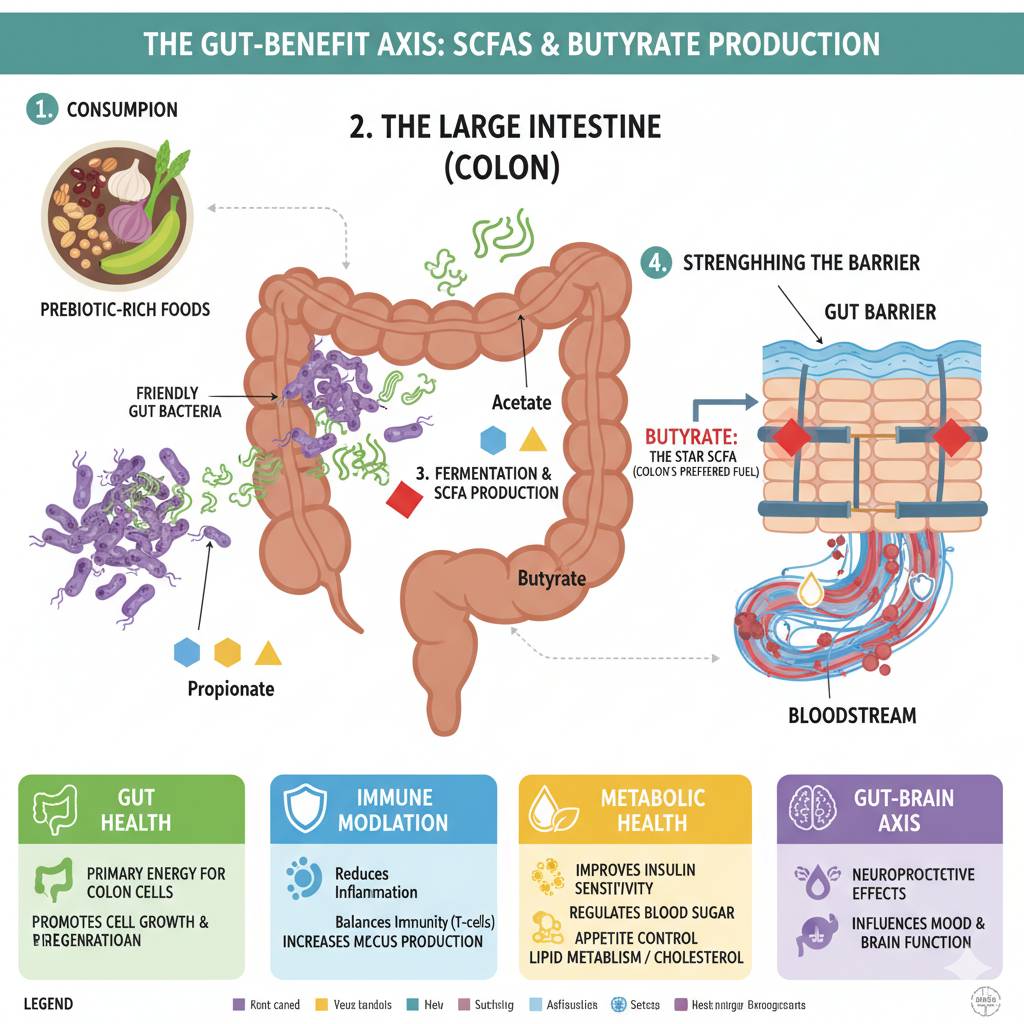
That’s a fantastic question! Short-Chain Fatty Acids (SCFAs), especially butyrate, are crucial metabolites produced when “friendly” gut bacteria ferment indigestible dietary fibers (like those found in whole grains, legumes, fruits, and vegetables).
These SCFAs have profound and far-reaching benefits, both locally in the gut and systemically throughout the body.
Key Benefits of SCFAs (Acetate, Propionate, Butyrate)
The three major SCFAs are acetate, propionate, and butyrate, and their collective benefits include:
1. Fuel and Nutrition for the Gut
- Primary Energy Source: SCFAs provide the main source of energy for the cells lining your colon (colonocytes), meeting about 60 – 70% of their energy needs.
- Promotes Cell Health: They help the intestinal epithelial cells grow, proliferate, and regenerate rapidly, which is essential for a healthy gut lining.
2. Strengthening the Gut Barrier
- “Tight Junctions”: SCFAs, particularly butyrate, help reinforce the “tight junctions” – the physical seals between the cells lining your gut. This strengthens the intestinal barrier and prevents unwanted substances (toxins, pathogens) from “leaking” into the bloodstream (often referred to as reducing “leaky gut”).
- Mucus Production: They stimulate the production of protective mucus, which provides another layer of defense against pathogens.
3. Powerful Anti-Inflammatory Effects
- Immune System Modulation: SCFAs interact with the immune cells in the gut (where about 70% of the immune system resides), helping to reduce inflammation.
- Balancing Immunity: They encourage the development of regulatory T-cells (Tregs), which help the immune system find its “just right” balance – ready to defend, but not overreactive. This is particularly important for conditions like Inflammatory Bowel Disease (IBD).
4. Metabolic and Systemic Health
- Blood Sugar Control: SCFAs can improve insulin sensitivity and help regulate blood sugar levels by stimulating the release of gut hormones like GLP-1.
- Appetite Regulation: They influence hormones that signal satiety (fullness), which may play a role in healthy weight management and appetite control.
- Liver and Cardiovascular Health: SCFAs can be involved in regulating lipid (fat) metabolism and may contribute to lowered cholesterol levels, supporting overall cardiovascular health.
The Special Role of Butyrate
While all SCFAs are beneficial, butyrate often receives the most attention due to its critical role as the preferred fuel source for colon cells and its potent effects:
| Benefit | Description |
| Colonocyte Fuel | The primary and most efficient energy source for the cells that line the large intestine (colonocytes). |
| Gut Barrier Integrity | Directly strengthens the physical barrier of the gut lining and helps repair damaged mucosal tissue. |
| Anti-Cancer Potential | In lab studies, butyrate has shown the ability to inhibit the growth of colon cancer cells and encourage their destruction (apoptosis). |
| Neuroprotective Effects | Butyrate is a key mediator in the gut-brain axis. It may influence brain function, mood, and is being studied for its potential role in managing neuroinflammation associated with conditions like Alzheimer’s and Parkinson’s disease. |
How to Maximize SCFA/Butyrate Production
The best way to increase SCFA and butyrate production is to consistently feed your friendly gut bacteria with the fibers they need to thrive.
- Fermentable Fibers (Prebiotics): Foods rich in prebiotics and resistant starch are the best fuel, including:
- Inulin: Flavorless Prebiotic Fiber, Easily added to soups or anything liquid.
- Acacia Fiber: Flavorless Prebiotic Fiber
- Legumes: Beans, lentils
- Whole Grains: Oats, barley
- Root Vegetables: Garlic, onions, asparagus, jicama
- Green Bananas/Plantains
- Cooked and Cooled Starches: Rice, potatoes, or pasta that has been cooked and then cooled develops resistant starch.
Would you like some suggestions for foods that are particularly high in the types of fiber that produce the most butyrate?




Leave a Reply